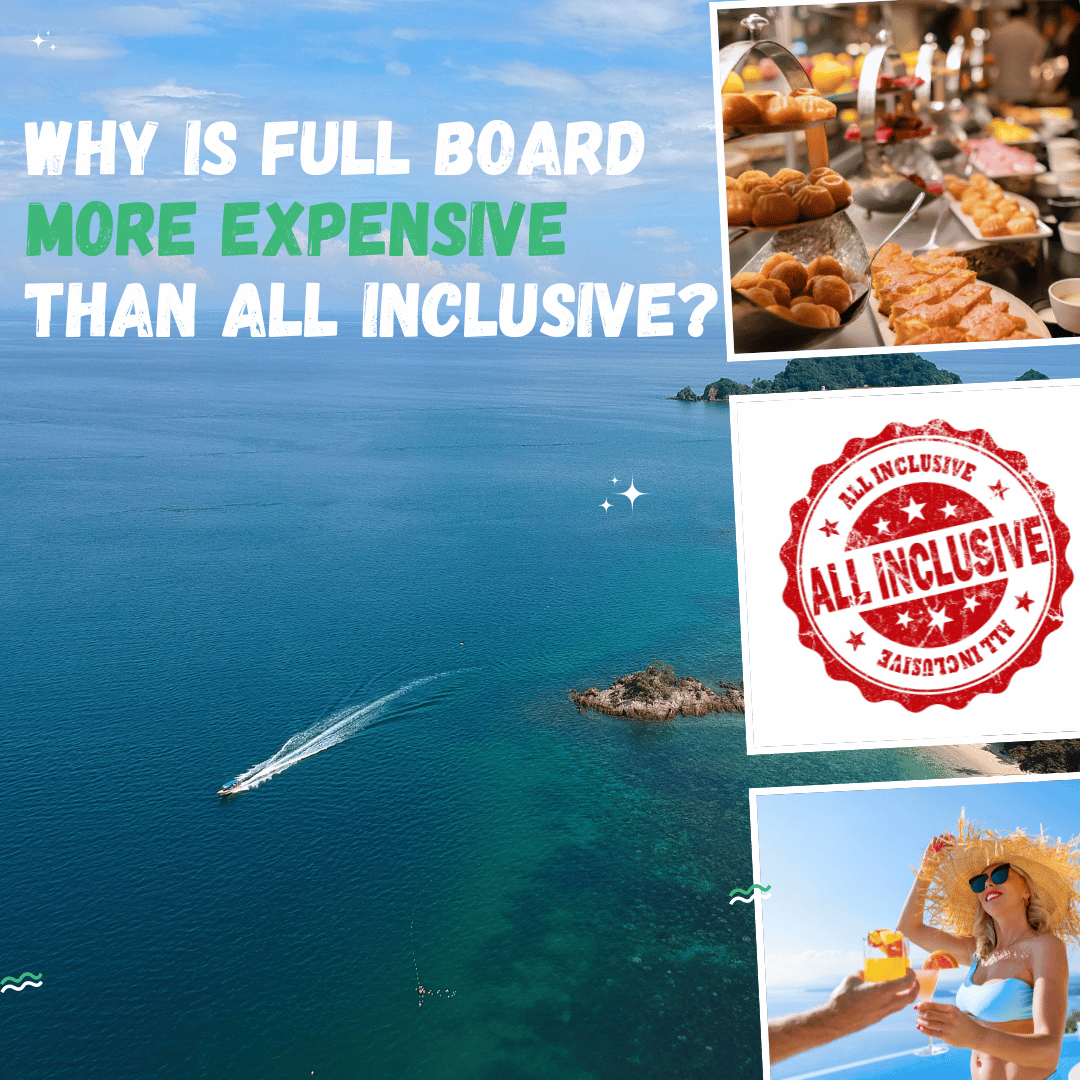
Updated: 11.4.25
Ever wondered why full board sometimes ends up costing more than an all-inclusive holiday?
To understand this, we first need to explore what each of these packages really includes—and what they don’t.
Why Is Full Board More Expensive Than All-Inclusive?
While full board may appear cheaper at first glance, the reality is that costs can quickly add up. That’s because full board typically includes breakfast, lunch, and dinner—but not drinks, snacks, or extras like activities. By contrast, all-inclusive packages roll most of these into one upfront cost. So although the initial price might be higher, it can often work out cheaper overall, making it a more budget-friendly choice for those who don’t want surprises on their bill.
What Is Full Board?
What’s Included?
Full board includes all three main meals—breakfast, lunch, and dinner—served at designated times, usually buffet-style. This setup gives guests a predictable meal plan without worrying about individual pricing.
It also offers the flexibility to explore local cuisine beyond the resort if desired. But be mindful: drinks and snacks outside mealtimes typically aren’t covered and will incur extra costs.
What’s Not Included?
Drinks, snacks, room service, and some hotel amenities usually fall outside the full board package. These are often charged separately, which can significantly impact your budget.
Related: How To Save Money On Your Next Holiday
What Is All-Inclusive?
What’s Included?
All-inclusive covers meals, drinks (often including alcohol), and may also include entertainment, activities, kids’ clubs, airport transfers, and more—all in one price.
This option is ideal for travellers who want a stress-free experience and a predictable holiday budget.
What’s Not Included?
Premium services, branded drinks, excursions, or spa treatments may incur extra costs. Always check the fine print to understand what’s truly covered.
Related: All-inclusive Vs Self-catering: The Great Holiday Dilemma
Full Board vs. All-Inclusive: A Price Comparison
Full Board
- Includes three main meals daily.
- Drinks and snacks usually cost extra.
- Provides freedom to dine out and explore.
- May appear cheaper but extras add up quickly.
All-Inclusive
- Includes meals, drinks, and often more.
- Usually higher upfront cost.
- No hidden fees for on-site food and drinks.
- Often includes additional entertainment and activities.
Which Costs More?
- Full board can become more expensive due to extra charges.
- All-inclusive provides better value if you plan to stay on-site and take full advantage of included services.
Hidden Costs in Full Board
Ordering a drink with dinner or grabbing a snack by the pool may seem minor—but they can quickly inflate your total spend. Some hotels also charge for extras like Wi-Fi or use of the gym and spa.
What Influences All-Inclusive Prices?
Time of year, location, and included services all affect pricing. High season and prime resort locations typically cost more. Luxurious perks like fine dining or private excursions can also elevate prices.
How to Decide What’s Best for You
If you prefer convenience and knowing exactly what you’ll spend, go for all-inclusive. But if you’re eager to explore the local scene and dine off-site, full board may offer more flexibility.
Final Thoughts: Full Board vs. All-Inclusive
Though full board may seem more budget-friendly at first, all-inclusive often delivers better overall value—especially if you enjoy a drink by the pool or extra snacks throughout the day.
Ultimately, the right choice comes down to your travel style. Pick the one that matches your holiday goals—and gives you peace of mind.
FAQs
What amenities are often included in all-inclusive packages?
All-inclusive packages may include water sports, entertainment, room service, airport transfers, and access to fitness or spa facilities.
Are there downsides to all-inclusive?
Some travellers find food and drink options repetitive or less authentic. Lower-end resorts may limit premium services or quality to keep costs down.
How do I find the best value option?
Compare multiple packages, check reviews, and use comparison tools to find the best deal for your needs. Booking 3–4 weeks before departure can offer last-minute savings.
Is half board a better middle ground?
Half board includes breakfast and dinner, making it a good option if you want flexibility for lunch and wish to explore local dining spots.
Need Help Planning?
Whether you’re team Full Board or All-Inclusive, we’ve got tips, resources, and travel guides to help you plan your next break. Visit RiiRoo Lifestyle Blog for more travel advice and budget-friendly hacks. Bon voyage!





Share:
Can I Call The Police If My Child Is Stealing From Me?
10 AMAZING Benefits of Sleeping with Your Windows Open: You Won't Believe #7